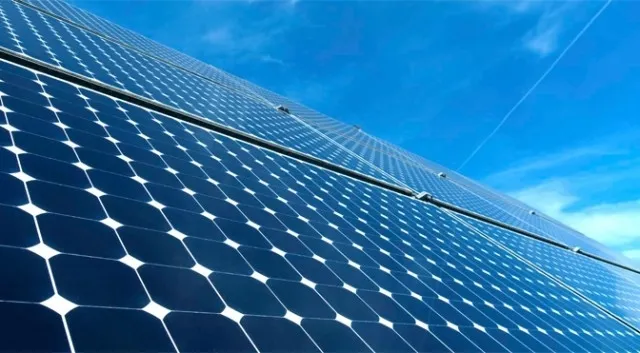Is Adani Green the First Renewable Energy IPP to Achieve Water Positivity?

Synopsis
Key Takeaways
- AGEL is the first renewable energy IPP globally to achieve water positivity.
- Water positivity was attained a year ahead of the target.
- AGEL's water conservation efforts are equivalent to 467 Olympic-sized swimming pools.
- Over 54% of its operational capacity utilizes robotic cleaning technology.
- AGEL's initiatives benefit over 123,000 people.
New Delhi, May 8 (NationPress) Adani Green Energy Limited (AGEL) has achieved a groundbreaking milestone by becoming the world’s first renewable energy (RE) Independent Power Producer (IPP) to attain water positivity across its entire operational portfolio, which boasts an impressive capacity of over 14 GW.
AGEL reached this significant achievement a year ahead of its FY26 target, setting a new benchmark for sustainability. It stands out as the first and only company among the top global 10 in terms of operational RE portfolio to accomplish this feat.
The company received certification as water positive from Intertek, a renowned global assurance organization, after conducting thorough audits and assessments of AGEL’s water accounting data across 103 operational sites and 85 water conservation initiatives. Notably, it is the only renewable energy enterprise in India of its magnitude to receive this certification, as per a company announcement.
Being water positive signifies the implementation of practices that not only conserve water but also enhance its availability in the surrounding environments. For industries, this entails replenishing more fresh water to nature than is consumed in their operations. A water-positive framework encompasses water preservation, optimized usage, and contributions to its replenishment.
This achievement is particularly significant, considering that most of AGEL’s solar and wind facilities are situated in regions where survival is a challenge, and water is a precious resource.
AGEL has demonstrated what many deemed impossible—transforming India’s most challenging terrains into sustainability hubs. From the harsh, barren lands of Khavda in Gujarat to the arid stretches of the Thar Desert, AGEL’s water positivity stands as a beacon of hope and innovation, according to the company.
To comprehend the scale of this accomplishment, it is essential to note that AGEL's water conservation efforts equate to approximately 467 Olympic-sized swimming pools and are sufficient to meet the half-yearly water requirements of Lakshadweep. Furthermore, revitalized ponds now serve over 123,000 individuals, including communities facing water scarcity. Over 54% of AGEL's operational capacity utilizes robotic cleaning technology for solar panels, saving around 546 million liters of water annually.
AGEL's journey towards this monumental achievement commenced with an ambitious ESG goal to make more than 200 MW of their operational plants water positive. This target was not only met in FY23 but was also expanded to encompass the entire operational portfolio by FY26, which AGEL accomplished a year ahead of schedule.
In a nation where water scarcity impacts millions, this milestone transcends mere corporate success; it represents a sustainability revolution. By employing advanced water-saving technologies—such as waterless robotic cleaning of solar panels, rejuvenation of traditional water bodies, rainwater harvesting, and innovative pilot projects like clean drinking water extracted from humid air—AGEL is demonstrating that clean energy can coexist with the preservation of vital natural resources.
“We don’t just generate green energy. We build it in the greenest way possible,” stated an AGEL spokesperson. “As climate change intensifies global water stress, India faces significant water security challenges. The nation has low levels of freshwater available per capita, coupled with high levels of consumption. That’s why this achievement is crucial.”
AGEL’s operational portfolio is certified as water positive, single-use plastic-free, and zero waste-to-landfill, underscoring the company’s dedication to fostering sustainable growth. What began as a daring ESG goal has now evolved into a nationwide standard, positioning AGEL, India’s largest RE company, at the forefront of the green energy and blue planet movement. Water resources are increasingly strained due to population growth, economic development, pollution, and climate change. A water-positive framework that focuses on water preservation, optimized consumption, and replenishment contributes to a more sustainable environment, the statement concluded.










